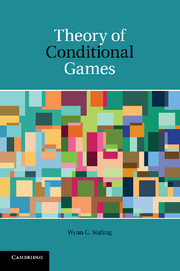A - Probability
Published online by Cambridge University Press: 05 January 2012
Summary
One cannot escape the feeling that these mathematical formulas have an independent existence and an intelligence of their own, that they are wiser than we are, wiser even than their discoverers, that we get more out of them than was originally put into them.
– Heinrich HertzThe uses of probability theory
Whenever one talks of foundational assumptions, it is hard to escape addressing philosophical issues. One area of mathematics that has long captured the interest of philosophers is probability theory. As betrayed by its very name, probability theory is typically applied to the epistemological issue of quantifying uncertainty regarding phenomena for which precise knowledge is not available.
In this book, we appropriate the mathematical structure and syntax of probability theory for a praxeological application. By so doing, we move far afield from its traditional epistemological home. Keeping in mind that this interpretation is nontraditional and may be controversial, we take considerable pains to provide a principle-based justification for appropriating probability theory for a nonepistemological application. As Hamming aptly observed, “it is dangerous to apply any part of science without understanding what is behind the theory” (Hamming, 1991, p. viii). Applying probability theory is essentially an art form and must be used with judgment and skill. The main difference between traditional usage and our usage is that, whereas probability is traditionally painted on an epistemological canvas, we choose to paint on a praxeological canvas as well.
- Type
- Chapter
- Information
- Theory of Conditional Games , pp. 216 - 222Publisher: Cambridge University PressPrint publication year: 2011



